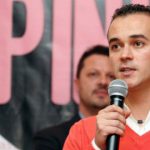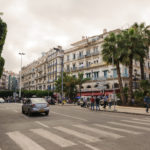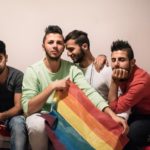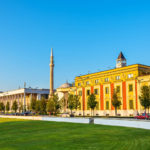By Richard Ammon
GlobalGayz.com
May 2016
Also see:
Austria Photo Galleries
Austria News & Reports Archive
This trip I visited Vienna and Graz (the second largest city in Austria) where LGBT life thrives not in abundant quantity but in quiet quality.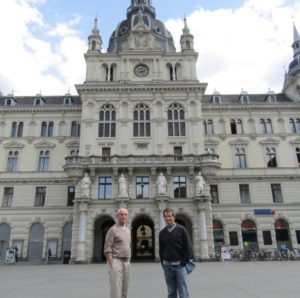
A week in Graz is a walk through a wonderland of picturesque history and modernity. The architecture of the city center is a UNESCO World Heritage Site with the bubbly Mur River running down the center passed baroque and gothic buildings as well as masses of chatty cafes and tidy chocolate shops. Numerous trolleys glide along steel tracks past countless commercial shops and trendy restaurants. (photo right, city hall)
A castle uphill watches over the humming peaceful life below where we stayed in the spotless Hotel Mariahilf with fluffy duvets on the beds and a cornucopia breakfast spread of bread, jams, eggs, sausages, porridge and fruit. A hundred feet away is the beautiful dual-towered church of Our Lady of Succor (aka Mariahilferkirche) Catholic baroque church that dates from from 1611. It adjoins a cloister of a Minorite monastery. For a country that is not highly devotional there is a disproportionate number of churches.
What it lacks in churchly congregants it more than makes up for in registered students in its six universities engaging about 40 thousand students at all degree levels and in wide curricula specialities. The oldest and largest is the University of Graz (aka Karl-Franzens University Graz). Students are not included in the population count of the city, which is about 320,000.
A person could get hypnotized by the serenity and culture here. There are about three dozen museums as well as an opera house and two concert halls. (But since the city is located in a valley there is some smog from vehicle traffic in the winter.)
LGBT Rights in Austria
Both male and female same-sex sexual activity have been legal in Austria for decades, since 1971. (In contrast, such activity in Denmark has been legal since 1931; gay marriage since 2012.) Joining the EU in 1995 required members to update their laws and attitudes about sexually diverse minorities. Registered partnerships in Austria were approved in 2010 and step-child adoption validated in 2013. Full joint 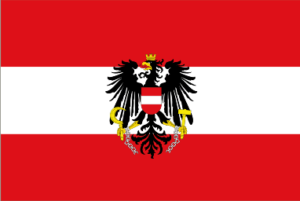 co-parent adoption was mandated by the Constitutional Court of Austria in January 2015. The age of consent is equal with heterosexuals–14 years.
co-parent adoption was mandated by the Constitutional Court of Austria in January 2015. The age of consent is equal with heterosexuals–14 years.
The Rechtskomitee Lambda (RKL) is Austria’s LGBT-rights organization with offices in every major city including Graz. It was founded in 1991 and is committed to the realization and safeguarding of human rights of lesbians, gays, bisexuals and transgenders rights. It is committed to equality, personal autonomy and sexual self- determination.
RKL does political lobbying in affiliation with Rosalila Pantherinnen Graz Center, as well as litigation in the courts. It offers free legal counseling in all areas of the law related to lesbian, gay, bisexual and transgender life. RKL also produces a quarterly newsletter Lus Amandi, which deals with legal and political issues of LGBT-life.
In the 15 years since its foundation RKL has helped achieve landmark political, statutory and court decisions: no anti-homosexual criminal laws in Austria since 2004; age of consent set at 14 for both gay and straight citizens; unmarried same-sex couples are legally equal to unmarried opposite-sex couples; registered partnerships have been approved but not gay marriage.
RKL president Dr. Helmut Graupner, serves as Vice-President of the International Lesbian and Gay Law Association ILGLaw and is the Austrian member of the European Commission on Sexual Orientation Law ECSOL.
Since same-sex marriage is not yet happened in Austria many consider Austria to be conservative and behind the times, which is not surprising given the centuries of influence from Roman Catholicism. However as times have become modern and liberal Austrian society has left the Church behind to evolve new laws and social opinions regarding sexual orientation and gender identity. Many say gay marriage is soon ahead. Only a small percent of all Austrians are now regular church goers.
Rosalila Pantherinnen
Although we came to Graz for the postcard views and historic ambiance I wanted to see a particular venue of no visual interest—the office of Rosalila Pantherinnen, the main LGBT focus center in Graz located on the main avenue that runs through the city and bustles with traffic all day—trolleys, cars, bicycles, pedestrians, delivery trucks and shoppers. I wanted to talk to the folks who run the place.
No sooner had I opened the ground floor front door than two cheerful young people greeted me and offered to help. I immediately noticed their excellent English and scrubbed appearance–well, this is Austria after all. Monica Gratzer and Chris Skutelnik (photo right) soon had 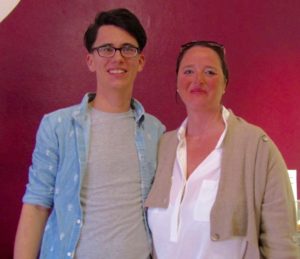 me loaded with printed materials and descriptions of the ‘scene’ in Graz. Not just the happening scene but the lives of people in the scene. Both these young staff members (there a half a dozen volunteers who also help maintain and organize Rosalila’s numerous activities as a registered NGO) are comfortably ‘out’ to their families. Indeed they still live with their families since they are still students.
me loaded with printed materials and descriptions of the ‘scene’ in Graz. Not just the happening scene but the lives of people in the scene. Both these young staff members (there a half a dozen volunteers who also help maintain and organize Rosalila’s numerous activities as a registered NGO) are comfortably ‘out’ to their families. Indeed they still live with their families since they are still students.
Graz is socially a comfortable gay city that is abreast of the political and social times, despite being surrounded with antique edifices, a cafe society and traditional cuisine. Recent tensions have arisen due to the influx of Middle East war refugees. Groups of humanitarian workers trying to help the immigrants are in conflict with right-wing opposition who want to build a fence to keep them out. So far there have been no serious conflicts with the LGBT community from the incoming Muslims.
Rosalila was started in 1991 in an effort to help young people discover their identy and aid in sorting out what is ‘out’ and how it feels and reactions to what others think of it. Being involuntarily different is not a comfortable condition and coming out is fraught with apprehension and fear. “What will people think of me and how will they react if I tell my family?” are common concerns said Monica as we sat over tea in the front office. This is one of the crucial functions of Rosalie–trust in another person for truth telling and intimate conversation. The office has any colorful booklets in English and German, one titled titled ‘Coming Out’ with questions and answers about that delicate process.
Rosalila also does outreach to a variety of official and informal groups such as schools, police, elected personnel and health agencies. “We ask to be invited to schools to talk to 13 to 17 year-olds about the diversity of people that includes LGBT students and the need for tolerance and understanding toward ‘different’ students that is part of healthy growing up. “We almost never have any problem with parents for our visits to schools. I think it saves them from having to talk to their kids about this awkward subject,” said Chris. (photo left, Rosalila logo; AKA Pink Panther)
There are also programs for foreign gays, (Ausufern) as well as youth social groups, film nights, parents’ meetings, political activism, music outings, lesbians (Donna Lila Women’s Group). Another program is called ‘Gay Vengers’ that sponsors outings and workshops that also help build community and friendship. A gay map of Graz is given out free.
Funds for Rosalila, a registered NGO in Austria, come from the city of Graz, the county of Styria, from fundraisers such as the Tuntenball Costume Ball and private donations. Rosalie has one paid staff member, Chris, who is assisted by seven other volunteers during the year as well as hundreds of others helping to prepare for the Ball.
Tuntenball is Graz’s biggest party-carnival costume-drag ball (and fundraiser) with revelers attired in everything from tuxedos to tutus. (photo left) It derives from a tradition of exotic masked-ball festivals in Berlin (for more than 120 years) that migrated to Vienna and Graz and in other Austrian cities. Tuntenball Graz started in 1990 at a university refectory and was immediately popular. 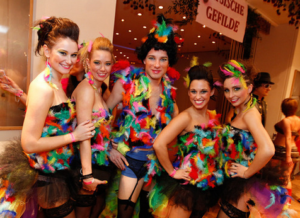 Since then it has evolved into being a highlight of the ball season (January and February) that includes all genders and orientations. The 2016 ball had a sea theme titled ‘Panthera—Beyond the Sea’. A program booklet with more than 50 pages listed the week’s events for entertaining the more than 1.000 visitors from all over Austria; the program also included numerous stories about gay marriage, fashion, relationships, style and sport.
Since then it has evolved into being a highlight of the ball season (January and February) that includes all genders and orientations. The 2016 ball had a sea theme titled ‘Panthera—Beyond the Sea’. A program booklet with more than 50 pages listed the week’s events for entertaining the more than 1.000 visitors from all over Austria; the program also included numerous stories about gay marriage, fashion, relationships, style and sport.
From October to June there are monthly theme nights—culture and leisure—with films such as Mambo Italiano, My Fair Lady, Moulin Rouge. These are mixed in with lectures on a variety of topics such as the River Mur, exhibitions of famous people and geography and more.
Eateries
When not dressing for the Ball LGBT life in Graz is spread around the city. I went to two gay owned restaurants on two separate nights, both trendy and fashionable. The first was called Sterz–‘your host for traditional life’–virtually across the street from my hotel. It was quiet, intimate with wooden tables and chairs and hand painted wall murals. I chatted with the gregarious owner Peter Kotinovitch (with pa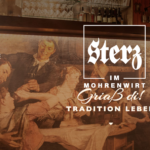 rtner Matthias Kramer) about their ownership of the restaurant for twenty years. He has never had any difficulty with customers or authorities. It is a popular dining place that serves the usual Austrian food such as Weinerschnitzel, goulash and more.
rtner Matthias Kramer) about their ownership of the restaurant for twenty years. He has never had any difficulty with customers or authorities. It is a popular dining place that serves the usual Austrian food such as Weinerschnitzel, goulash and more.
The second restaurant was owned by three women named La Meskla near the opera house (where we went after dinner to see Tchaikovsky’s ’Sleeping Beauty’ ballet magnificently performed) and as always, easily accessible by at least two trolley lines. Two of the owners, sisters Claudia and Julia Gunzberg, are natives of Graz and the third owner is from Peru, Vanessa Ceballos Aguirre. Two of the owners are life partners as well. 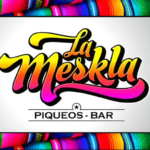 They met years ago and quickly discovered their common interest incoming. So today a customer can order bi-national foods such as the usual Weinerschnitzel (don’t ask what the ingredients are!) and Peruvian Ceviche or Causa.
They met years ago and quickly discovered their common interest incoming. So today a customer can order bi-national foods such as the usual Weinerschnitzel (don’t ask what the ingredients are!) and Peruvian Ceviche or Causa.
In both restaurants customers were blended, gay and straight couples and singles. This is typical of Graz and Vienna. (According to Trip advisor there are more than 400 restaurants in Graz. I didn’t bother to count.) The LGBT population is invisibly mixed in with the larger population. One man said to me, when I asked if there was a gay organization in Vienna, “we don’t need an office here—for what?”, meaning there was no more to be gained by advocating or holding rallies. (Obviously he was not thinking about gay marriage.) The main events today are social, not political. In both Graz and Vienna advocating on behalf of an oppressed minority, against a homophobic government or church, is a moot point.
Vignette of Two Gay Men
There are many faces of gay life in Austria; grand and small. This one is a small, about Niko a 58 year old accountant who has shared an apartment with his partner of fifteen years, Hans; both are retired. We met at a restaurant in Graz, by chance, one night as we sat at adjoining tables, each devouring our entrees. They were a cordial quiet couple with a small circle of friends with whom they shared a passion for opera and ballet. (stock photo right: not Niko and Hans)
As it happened that night they were soon off to the Graz opera house to see a performance of Tchaikovsky’s ‘Sle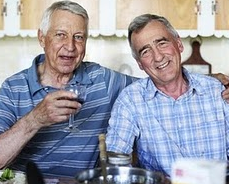 eping Beauty’ ballet. “Fine music is a language for us, like being together with deep friends for many years, even before we met… I think the language of music was our language of love, of being together with the same feelings, without words, just beautiful music.”
eping Beauty’ ballet. “Fine music is a language for us, like being together with deep friends for many years, even before we met… I think the language of music was our language of love, of being together with the same feelings, without words, just beautiful music.”
This warm and loving interaction at the restaurant was a symbol of how gay life is lived in Graz for many couples: quietly, privately or with close friends, without the need for parades or fanfare, without interruption from outside interference—government, church, laws, homophobes. It is a life of calm, of kindness, of gentle touching before sleep, and waking up to the warmth of each other. “Yes, of course, sometimes there is some sex but it is not wild, just comfortable; usually we don’t require more. It’s the touching of his fingertips on my neck or hearing his breathing as we begin to wake up in the morning light,” confessed Hans as he touched Niko’s hand.
‘Pride’ Magazine is a monthly national gay and lesbian magazine printed in Linz for the whole country. A recent issue focused on the issue of registered partnerships (eingetragene partnerschaft) and rights and privileges as well as limitations.
Another group is called HuG—Homosexuality and Faith—that has weekly meetings for discussions, prayer and meditation—and occasionally a picnic at the Graz castle. There are many more groups, parties and such as CSD Graz Parkfest that also includes lectures; this year with the theme of homosexuality and Islam.
Other publications are Vangardist, Xtra News and Lambda Nachrichten.
A Word of History
In 1873, the world famous German born doctor Richard Krafft-Ebing (photo right) moved to Graz where he began his work on human sexual issues. In 1886 he published ‘Psychopathia Sexualis’,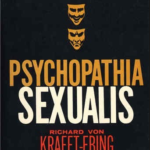 which documented and classified a number of cases of sexual perversion. Chief among these cases was his interest in sexual inversion or “contrary sexuality,” a concept that gained considerable currency and definition. It was Krafft-Ebing who gave the label ‘homosexuality’ to the medical lexicon in place of inversion. However homosexuality remained illegal in Austria until 1971 which made it difficult for WW2 holocaust survivors to openly discuss their persecution or to press for reparations.
which documented and classified a number of cases of sexual perversion. Chief among these cases was his interest in sexual inversion or “contrary sexuality,” a concept that gained considerable currency and definition. It was Krafft-Ebing who gave the label ‘homosexuality’ to the medical lexicon in place of inversion. However homosexuality remained illegal in Austria until 1971 which made it difficult for WW2 holocaust survivors to openly discuss their persecution or to press for reparations.
The 1970s saw a resurgence of gay and lesbian activism and community building. The lifting of sodomy laws in 1971 reflected the increasing visibility of the homosexual emancipation movement that had been active since the 1968 student protests that reverberated throughout Europe.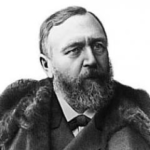
Oddly, in the same year that Austria decriminalized homosexuality, it passed a ban against homosexual organizations and positive publicity about homosexuality, prejudicially reaffirming laws inherited from Nazi times. These laws, however, went mostly unenforced but still had the effect of inhibiting gay and lesbian advocacy. Finally, in 1996 the government abolished those laws which cleared the way for the first gay pride parade that same year.

